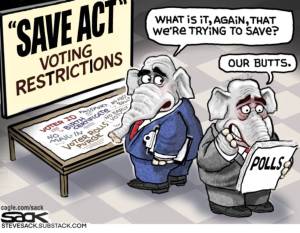Editorial: Rohla for Everett, Katims for Edmonds school boards
Published 1:30 am Thursday, July 20, 2023
By The Herald Editorial Board
Two school board races — for Everett and Edmonds school districts — drew more than two candidates, placing the races on the Aug. 1 primary ballot to determine the top two finalists for he Nov. 7 general election.
Everett School Board, Position 5, at-large
The decision by current school board president Pam LeSesne not to seek reelection opened the seat to four challengers: Charles Adkins, Ryne Rohla, Roman Rewolinski and Janelle Burke.
Adkins is a policy analyst for the Tulalip Tribes, policy director for the Children’s Alliance and a member of the Yurok Tribe in Klamath, Calif. A graduate of Everett High School with a bachelor’s degree from The Evergreen State College, Adkins spent time as a homeless youth and found assistance through Everett’s Cocoon House shelter.
Adkins, having experienced homelessness himself, said a leading focus if elected would be on the 1,500 students served by the district who do not have stable housing. Adkins said he would work to make sure those students have the resources they need as well as advocate for housing for families and students.
Rohla is an economist with the state Department of Social and Health Services and also works part time with the state Attorney General’s Office and has taught at Washington State University. He has a doctorate in economics from WSU, and graduated from Everett Community College and Stanwood High School. He is a member of the Port Gardner PTSA with three young children, one soon entering the school system. Rohla ran unsuccessfully for state Legislature last year.
Rohla said a leading concern is the number of students in the district not meeting competency standards. Prior to the pandemic, he noted, 80 percent of students with disabilities met science standards; that has since dropped to 17 percent. “We have a lot of work today,” he said. He is especially concerned for students soon leaving high school and needing post-secondary credentials and degrees. Rohla wants to increase access to dual-credit programs, offering high school and college credit for the same course.
Rewolinski is a U.S. Navy veteran and a CPA, working in finance and accounting. He has a masters in professional accounting. He also has volunteered with the district’s financial advisory committee. He will have three children in district schools next year at elementary, middle and high school.
Rewolinski is concerned for student safety and wants to see increased scrutiny on controlled access into schools, emergency action planning and greater partnerships with law enforcement. He also said he has talked with many teachers and wants to improve access to resources to help them do their jobs and provide a world-class education.
Burke is a designer and photographer with a design studio and a journalist with WakeUpSnoCo. She serves as a co-chair with Braver Angels Snohomish County Alliance. A mother of seven children, with three currently enrolled in Everett schools, she has previously run for the school board in 2017, 2019 and 2021.
Burke said in her role on the board she would focus on providing resources for conflict resolution, mentoring and restorative justice and introduce community justice intervention programs for students. Regarding academics she proposed setting up “homework houses” to offer after-school tutoring, bonding and peer mentorship.
Voters are presented with four thoughtful candidates, genuinely concerned with improving and sustaining education for the community’s children.
Tasked with assembling a school board of varied talents, and considering concerns for the financial stability of public education in general and for the Everett district in particular, voters should consider the backgrounds of Rewolinski and Rohla.
Rewolinski’s volunteer work with the finance panel demonstrates his commitment, but Rohla impresses as someone who is quick to get to the core of education’s immediate needs to do as much as possible with the tightened financial resources available, “to boost outcomes on a low-cost basis,” he said. One suggestion, he said, would be to investigate generative AI (artificial intelligence) tutoring, not to provide answers or essays for students, but to coach them through homework and prepare them for class.
Rohla’s desire to increase access to dual-credit programs in high schools speaks to the need to not only see kids earn their high school diplomas but get a jump on skills they will need after high school and on degrees and accreditation that are now necessary for family-wage jobs. Rohla’s analytical skills and his ability to communicate his ideas would serve the board, the district and its students well.
Edmonds School Board, District 5
Incumbent board member Nancy Katims, completing her first term, faces a challenge by first-time candidates Nicholas Jenkins and Arjun Kathuria.
Katims, prior to running in 2019, retired from Edmonds schools, last as a program director for the district’s Student Learning Department for 16 years, with 20 years total with Edmonds. She worked a total of 41 years in education, including time as an instructor and administrator for positions nationwide.
Originally from Scotland, Jenkins came to the U.S. in 1984, originally working in commercial fishing but completed a law degree at the University of Washington. He has worked as a defense lawyer for 20 years and frequently provides legal services pro bono.
Kathuria came to the U.S. from India when he was 18 and earned an accounting degree, then a masters in finance from New York University. He currently is employed as a program manager at Amazon and previously worked for Facebook. He volunteers with StreetWise Partners as a mentor for unemployed and underemployed people to help develop job skills.
All three candidates shared concerns for student achievement and for the state’s and the district’s financial position. Like many districts in the county, Edmonds laid off teachers — 36 full-time equivalents — earlier in the year to deal with multi-million budget shortfalls.
On academics, Jenkins said schools should be focusing efforts on the foundational skills of English and math. “That’s what unlocks everything else,” he said.
Kathuria agreed with that academic focus, and said he would bring a neutral perspective to the board, without a particular agenda, to consider how to provide the resources for teachers and students, and provide transparency into the board’s decisions for parents and community members.
One factor in the budget crisis has been a drop in enrollment following the pandemic. Kathuria sees outreach necessary to get students back in classes and moving toward graduation, college and careers, persuading students on the necessity of post-secondary credentials.
Jenkins sees the crisis more broadly, with a greater responsibility at the state level to provide the “ample” funding promised in the state constitution and in the reforms that were intended to satisfy the state Supreme Court’s McCleary decision.
Katims said her focus now is on getting kids back on track academically, socially and emotionally, with a particular focus on the district’s graduation rate; and on addressing the district budget and its funding.
School boards can’t make the decisions that state lawmakers make on funding, but they can lobby to influence those discussions, she said, and then work within their own budgets to provide for students.
“I am more committed than ever for fighting for our kids and our parents, our families in our community and our educators,” she said.
For Katims, that has meant looking for funding where available. She said she wrote a proposal earlier this year to the city of Edmonds to use some of its federal covid funding to support a student intervention counselor at three elementary schools, a use allowed by the federal grant program. Recently, the Edmonds City Council approved those funds.
McCleary, Katims said, did deliver needed reforms, particularly for teacher pay, but work remains on fixing the state’s formula for allocating funding and increasing funding for resources such as paraprofessionals, counselors and more.
Kathuria and Jenkins offer impressive resumes and demonstrate a keen commitment to the district’s students and families, but Katims, backed by her decades of academic and administrative experience and one term on the board, including her role as board president, demonstrates the necessity that she continue that work to pursue academic improvement and a secure a sustainable budget for the district.



